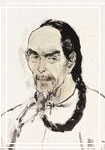《己亥杂诗》 龚自珍
漠漠郁金香在臂,亭亭古玉佩当腰。
气寒西北何人剑,声满东南几处箫。
一川星斗烂无数,长天一月坠林梢。
作者简介(龚自珍)

龚自珍(1792年8月22日~1841年9月26日)清代思想家、文学家及改良主义的先驱者。27岁中举人,38岁中进士。曾任内阁中书、宗人府主事和礼部主事等官职。主张革除弊政,抵制外国侵略,曾全力支持林则徐禁除鸦片。48岁辞官南归,次年暴卒于江苏丹阳云阳书院。他的诗文主张“更法”、“改图”,揭露清统治者的腐朽,洋溢着爱国热情,被柳亚子誉为“三百年来第一流”。著有《定庵文集》,留存文章300余篇,诗词近800首,今人辑为《龚自珍全集》。著名诗作《己亥杂诗》共315首。
《己亥杂诗》龚自珍 翻译、赏析和诗意
《己亥杂诗》是清代诗人龚自珍创作的一首诗词。以下是该诗的中文译文、诗意和赏析:
秋心如海复如潮,
Autumnal heart is like the sea, rising and falling like tides,
The poet compares his emotions in autumn to the vastness and unpredictability of the sea. Just like the ebb and flow of tides, his feelings fluctuate and surge within him.
惟有秋魂不可招。
Only the autumn soul cannot be summoned.
The poet suggests that despite the changeable nature of his emotions, his autumnal spirit remains steadfast and cannot be easily influenced or controlled.
漠漠郁金香在臂,
Faintly, the fragrance of tulips lingers in the air,
This line evokes the image of the poet sensing the delicate scent of tulips. The ethereal and elusive nature of the fragrance reflects the poet's longing for beauty and tranquility.
亭亭古玉佩当腰。
Graceful and exquisite, an ancient jade pendant adorns the waist.
Here, the poet describes the elegance and preciousness of an ancient jade pendant worn around the waist. It symbolizes the poet's appreciation for refined and timeless beauty.
气寒西北何人剑,
In the cold air, who wields a sword in the northwest?
This line portrays a sense of desolation and mystery, as the poet wonders about the identity of the person wielding a sword in the cold and remote northwest. It hints at a longing for adventure and the unknown.
声满东南几处箫。
The sound of flutes fills several places in the southeast.
The poet depicts the enchanting melodies of flutes resonating through the southeast region. It suggests a sense of harmony and tranquility, contrasting with the previous line's imagery of the northwest. The contrast adds depth to the poet's emotional landscape.
一川星斗烂无数,
Countless stars shimmer along the river,
This line describes the night sky, with numerous stars sparkling and illuminating the river. It conveys a sense of vastness and beauty, symbolizing the infinite possibilities and wonders of the universe.
长天一月坠林梢。
From the lofty sky, the moon descends upon the treetops.
This final line portrays the moon descending from the sky and resting upon the treetops. It evokes a serene and poetic image, suggesting the beauty and transience of nature.
《己亥杂诗》通过描绘秋天的心境、自然景物和感慨,表达了诗人内心的情感和对美的追求。整首诗词以秋天为主题,通过运用意象、比喻和对比等修辞手法,展示了诗人对自然与人文之间的联系和对生活的思考。从澎湃的内心情感到冷寂的西北,从雅致的古玉到动人的箫声,从星斗璀璨到月光如水,诗中融合了丰富的意象和情绪,营造了一种既富有触动又富有想象力的诗意。整体而言,这首诗词展示了诗人对自然与人生的感悟,以及对美的追求与思考,让读者在品读中领略到秋天的壮美和人生的深意。
《己亥杂诗》龚自珍 拼音读音参考
jǐ hài zá shī
己亥杂诗
qiū xīn rú hǎi fù rú cháo, wéi yǒu qiū hún bù kě zhāo.
秋心如海复如潮,惟有秋魂不可招。
mò mò yù jīn xiāng zài bì, tíng tíng gǔ yù pèi dāng yāo.
漠漠郁金香在臂,亭亭古玉佩当腰。
qì hán xī běi hé rén jiàn, shēng mǎn dōng nán jǐ chù xiāo.
气寒西北何人剑,声满东南几处箫。
yī chuān xīng dǒu làn wú shù, cháng tiān yī yuè zhuì lín shāo.
一川星斗烂无数,长天一月坠林梢。


